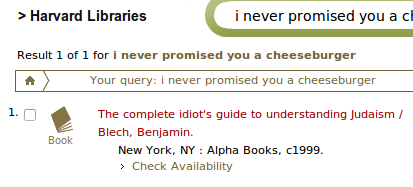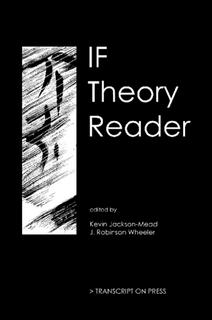[An announcement from Penn’s Kelly Writers House:]
We’re pulling out all the constraints for our OULIPOLOOZA next Tuesday,
March 15, at 7:00 pm. Organized by our own Sarah Arkebauer (C’11) and
Michelle Taransky, this celebration of all things Oulipo will feature five
experts and aficionados talking about the “Ouvroir de littérature
potentielle,” the highly-influential French school of avant garde poetry.
The evening will be rounded out by the launching “An Oulipolooza,” a
collection of new Oulipian writing, and a constraint-inspired reception.
This is one celebration you should not A Void!
The Kelly Writers House presents
OULIPOLOOZA
a celebration of potential literature
featuring
KATIE PRICE
LOUIS BURY
JEAN-MICHEL RABATÉ
GERALD PRINCE
and NICK MONTFORT
Tuesday, March 15, at 7:00 PM in the Arts Café
Kelly Writers House | 3805 Locust Walk, Philadelphia, PA
No registration required – this event is free & open to the public
Come help us celebrate the continuing potential of literatures by attending
the OULIPOLOOZA, a Kelly Writers House-style celebration of all things
Oulipo. The OuLiPo, or “Ouvroir de littérature potentielle” (workshop of
potential literature), is a group of experimental French poets founded in
1960, devoted to exploring the potential of literature, language and freedom
through the lenses of different constraints. Oulipolooza will include
readings about the Oulipo by five experts and aficionados, a reception full
of Oulipo-inspired foods, and the launch of “An Oulipolooza”: a collection
of oulipian texts.
KATIE L. PRICE is a Ph.D. candidate in the University of Pennsylvania’s
English Department completing her dissertation, tentatively titled “‘The
Tangential Point’: Pataphysical Practice in Post-War Poetry.” She is also an
associate editor for Electronic Poetry Center, co-coordinator of the Poetry
& Poetics graduate group, and will teach a course in the fall entitled
Poetry, Technology, Gender and Globalization.
LOUIS BURY teaches literature at New York University, is a part-time
professional poker player, and is completing a constraint-based dissertation
about constraint-based writing, titled Exercises in Criticism, at the
Graduate Center of the City University of New York.
JEAN-MICHEL RABATÉ is Vartan Gregorian Professor in the Humanities at the
University of Pennsylvania. Co-founder and curator of Slought Foundation,
he is a senior editor of the Journal of Modern Literature. A fellow of the
American Academy of Arts and Sciences, he has authored or edited more than
thirty books on modernism, psychoanalysis, contemporary art and philosophy.
Recent titles include Lacan Literario (2007), 1913: The cradle of modernism
(2007), The Ethic of the Lie (2008) and Etant donnes: 1) l’art, 2) le
crime (2010). Currently, he is editing a collection of essays on Modernism
and Theory. He is the president of the Samuel Beckett Society and completing
a book on Samuel Beckett and philosophy.
GERALD PRINCE is Professor of Romance Languages and Head of the French
section at the University of Pennsylvania. He is the author of many articles
and reviews on narrative theory and on modern (French) literature as well as
of several books (including A Dictionary of Narratology and Guide du roman
de langue française: 1901-1950) and his work has been translated into a
dozen languages. A co-editor of the “Stages” series for the University of
Nebraska Press and a member of a dozen editorial and advisory boards, Prince
is working on the second volume of his Guide du roman (1951-2000).
NICK MONTFORT writes computational and constrained poetry, develops computer
games, and is a critic, theorist, and scholar of computational art and
media. He is associate professor of digital media in the Program in Writing
and Humanistic Studies at the Massachusetts Institute of Technology, and is
now serving as president of the Electronic Literature Organization. He
earned a Ph.D. in computer and information science from the University of
Pennsylvania.







